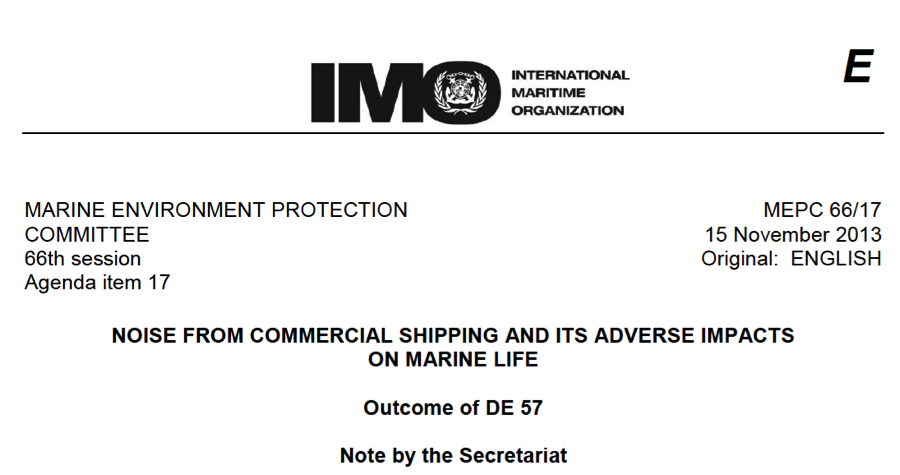The International Maritime Organization (IMO) recently adopted guidelines to reduce underwater noise from commercial ships.
The new guidelines:
- recognize that shipping noise can have short-term and long-term impacts on marine life;
- call for measurement of shipping noise according to objective ISO standards, which are themselves on the verge of adoption;
- identify computational models for determining effective quieting measures;
- provide guidance for designing quieter ships and for reducing noise from existing ships, especially from propeller cavitation; and
- advise owners and operators on how to minimize noise through ship operations and maintenance, such as by polishing ship propellers to remove fouling and surface roughness.
While these (as yet) are voluntary guidelines, not mandatory code, they put the IMO’s imprimatur on noise reduction. Thanks go to the U.S. government, which put the issue on IMO’s agenda and shepherded it through the IMO’s processes, and to Germany, Australia, Spain, the UK, and other governments that supported and helped develop the guidelines. Thanks also to the coalition of progressive trade groups, research and academic scientists, and NGOs who partnered with member states to get this done, most notably NRDC. The more difficult work – implementation – lies ahead, but the guidelines are a milestone in the advancement of this issue.

Later this month, there will be a short article in the Journal of Ocean Technology written by Brandon Southall on the history and evolution of this issue, the text of which is given below. If you would like a copy of the IMO document describing what was voted on and the guidelines, please contact Brandon.Southall@sea-inc.net
Partnerships for Global Change on Ship Noise
Brandon L. Southall
An international collaboration of scientists, environmental groups, government agencies, and forward-thinking sectors of the shipping industry aims to reduce noise from large ships and associated negative effects on ocean life. And a landmark vote to adopt new guidelines for vessel quieting is just around the corner.
Imagine being beneath the sea with a quiet re-breather system, listening to the underwater world. Among the rushing of waves, snapping shrimp, glumping fish, and whistling dolphins you hear the rumble of a distant ship. You might wonder what it was and whether it was approaching. Or you might recognize it as a symbol of human advancement – a vital flow of industry delivering goods to far corners of the world. To many of us that began working together a decade ago it represented both a challenging, broad-scale concern for sound-sensitive marine life and an opportunity to effect change proactively beyond confrontational divisions that permeate many environmental issues.
Unlike Cousteau’s vision of a silent world, the ocean is naturally noisy – sounds of earthquakes and whales are heard for hundreds of kilometers. But some areas, particularly coastal northern hemisphere regions, have seen major increases in low-frequency (<1000 Hz) noise. The source is human growth and industry, particularly the tens of thousands of commercial ships now continuously plying the seas as our primary global means of distribution.
Public awareness of how sounds affect animals is driven by dramatic but rare events like whale beachings following sonar events. Ship-radiated noise presents less obvious but continuous, broadly-distributed issues. These sounds can affect marine animals in sub-lethal yet significant ways, reducing communication ranges particularly for species reliant on low-frequency sounds to socialize and navigate like whales, seals, and fishes.
Reducing impacts from the aggregate noise of many vessels is challenging given the global scale, typical lifespan of a large ship, and the historical lack of regulation. But progress has been made since the recognition of this as an important conservation matter at the first international symposium on shipping noise convened in 2004 by the U.S. National Oceanic and Atmospheric Administration (NOAA) and workshops on vessel quieting by NOAA and the environmental organization Okeanos – Foundation for the Sea. An international collaboration of proactive representatives of the shipping industry, environmental, government, and scientific communities is pushing solutions forward through the International Maritime Organization (IMO) Marine Environment Protection Committee. This spring, the IMO will vote on new guidelines outlining engineering solutions to reduce incidentally radiated noise from large commercial ships. This is an historic milestone in a long quest toward tangible reduction of the global noise footprint of one of our oldest and most important industries.
